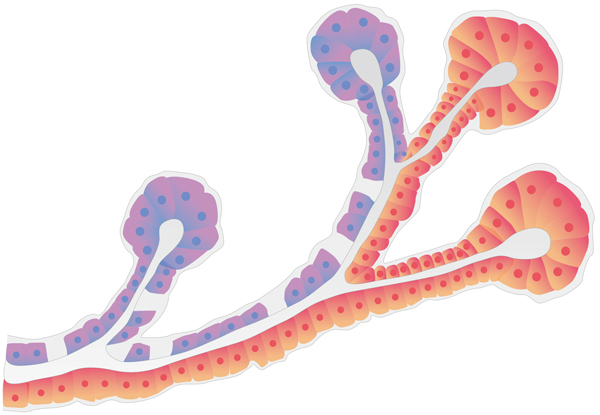
Research Activities
Research Activities
Publications
February 08, 2019
A new factor that regulates insulin production

The expression of TFF2 in exocrine tissue correlated with the survival of insulin-producing cells in endocrine tissue.
The pancreas can be divided into two parts with different functions. The exocrine tissue secretes enzymes to digest food, and the endocrine tissue secretes hormones, the most famous being insulin. These two tissues are thought to function independently one another, but the research team of Prof. Yoshiya Kawaguchi has previously found that inactivating the gene Pdx1 only in exocrine tissue causes abnormalities in the endocrine tissue that resemble diabetes.
"These observations suggested the existence of factors in exocrine tissue that regulate development and function of endocrine tissue," he explains.
A more detailed analysis in a new report found Trefoil factor 2 (TFF2) is expressed only in the exocrine pancreas and is significantly suppressed in mice with Pdx1 knocked out. This difference held during the development of the pancreas and in adult pancreas. Accordingly, the mutant mice showed a depleted number of endocrine progenitor cells and insulin-secreting cells.
Additional experiments showed that TFF2 functions to prevent the cells from dying.
"We could obtain more insulin-secreting cells if we added TFF2 to the Pdx1 knockout pancreas in culture. We found a CXCR4 inhibitor prevented this increase," notes Ph.D. student and pancreatic surgeon Dr. Koji Hirata, who first-authored the study.
TFF2 was first identified in the pancreas in 1982, but has since been found in many other tissues. CXCR4, on the other hand, is a well-studied receptor that is responsible for cell migration, including the migration of blood cells and cancer cells.
Hirata's findings indicate that the preservation of endocrine cells depends on some sort of cooperation between TFF2 and CXCR4. However, CXCR4 did not have an effect on the preservation of progenitor cells.
"This finding suggests an unknown receptor exists for TFF2 in endocrine tissue development," concludes Kawaguchi.
Because diabetes is associated with the endocrine tissue, studies have focused on the establishment of abnormalities in this tissue. Connections between exocrine and endocrine tissues, such as TFF2, indicate that a wider net is needed when studying this disease.
Paper Details
- Journal: Scientific Reports
- Title: Exocrine tissue-driven TFF2 prevents apoptotic death of endocrine lineage during pancreas organogenesis
- Authors: Koji Hirata1,2, Sota Kodama1,2, Yasuhiro Nakano2, Yasuko Minaki-Nakagawa2, Yoshiki Aoyama1,2, Morito Sakikubo1,2, Toshihiko Goto1,2, Masahiro Yoshida1,2, Toshihiko Masui1, Takuya Yamamoto3, Shinji Uemoto1 and Yoshiya Kawaguchi2
- Author Affiliations:
- Department of Hepato-Biliary-Pancreatic Surgery and Transplantation, Kyoto University Graduate School of Medicine, Kyoto, Japan
- Center for iPS Cell Research and Application (CiRA), Kyoto University, Kyoto, Japan






















